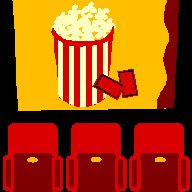It was mostly a ho-hum year, cinematically speaking. Some of the most heavily hyped, critically praised movies turned out to be, to my mind, duds. Some were
superduds.
Kenneth Turan, Rex Reed and I were practically the only critics to scoff at the absurd
Black Swan. I don't mind being a voice of reason in all the hyperbole and hubbub. I'm in esteemed company.
Here are the movies that, for me, made going to the cinema worthwhile this year.
1.
The Ghost Writer. Easily my favorite film of the year. I don't get why it's being left out of all the big award nominations. A modern-day mystery/political thriller that Hitchcock might've made today. It was fun to see
Pierce Brosnan in a dramatic role again (as a retired British PM), and
Ewan McGregor is at the top of his game as the ghost writer hired to pen the PM's memoirs -- after the first ghost writer turns up dead. Fugitive
Roman Polanski directed.
2.
The Town. Career bank robbers are thrown off their game when they take a hostage and
Ben Affleck's character ends up falling for her.
Jon Hamm chases the gang and looks darn good doing it.
3.
Blue Valentine. Michelle Williams and
Ryan Gosling fall for each other, wed, have a child and then end up being the source of each other's suffering. Bleak and tough to watch, but a must-see due to the two powerful performances from its leads.
4.
The King's Speech. We don't often see a member of the British royal family as an underdog, but
Colin Firth's King George VI is a reluctant king with a severe stutter. His nation needs him to be a brilliant orator, as Britain heads for war with Germany. You'll be rooting for George ("Bertie" to his family) to overcome his impediment with the help of the speech therapist played by
Geoffrey Rush. Rush's Lionel turns out to be the best friend a monarch could hope for. A royal bromance!
5.
The Fighter. Mark Wahlberg shows off his buffness but allows co-star
Christian Bale to shine as his twitchy, has-been older brother. Both brothers are boxers; one (Wahlberg's Micky) is on his way up. The other (Bale's Dicky) has already peaked, although he's convinced he'll make a comeback.
Melissa Leo is perfect as the matriarch of her gritty, working-class brood, and
Amy Adams plays the Boston barkeep who may help turn Micky's fortunes around.
6.
The Social Network. The movie for the Facebook generation. Building web code should not make for fascinating viewing, yet much of the film's drama centers on the technical aspects (and ticking clock) involved in launching this enterprise.
Jesse Eisenberg makes Mark Zuckerberg human and even a little likable. Plus, it's always fun to see the multitalented
Justin Timberlake on screen.
7.
Catfish. What can you believe and what can't you? That's the central question at the heart of this documentary. (Or, is it a mockumentary?)
Catfish is about people not being who they say they are online. It's a mystery, a drama and a cautionary tale. If
The Social Network is the narrative feature for the Facebook generation, this is the equivalent documentary.
8.
Fanny, Annie & Danny. Haven't heard of San Francisco-based writer/director
Chris Brown? You will. In this quirky drama, he's created a family whose members hate themselves and, for the most part, hate each other. When this fragile, wounded clan gets together for Christmas, there are awkward moments, tears and yelling, guilt trips, hurt feelings and unpleasant surprises.
9.
Animal Kingdom. Grandma Smurf (Golden Globe-nominated
Jacki Weaver) is a big player in an Australian crime syndicate, and she controls every move -- hardly any of them legal -- her adult sons make. She's all her grandson, J, has left, and he must decide if he'll stay loyal to his trigger-happy family or trust this policeman who offers him safety.
10.
Waiting for Superman. Director
Davis Guggenheim tries to find reasons for hope in his expose of the shoddy state of our national public education system. But, we're left with the discouraging feeling that the education each child in this country gets is up to nothing more than luck.
Honorable mention:
Rabbit Hole
The Other Guys
Inside Job
127 Hours
True Grit
Year's biggest disappointments:
Winter's Bone. The Clampetts meet Waiting for Godot.
The Kids are All Right. No, they're not. And, neither is this movie.
Black Swan. One hot, trashy mess.
I Am Love. Beautiful to behold, but a one-dimensional bore.































